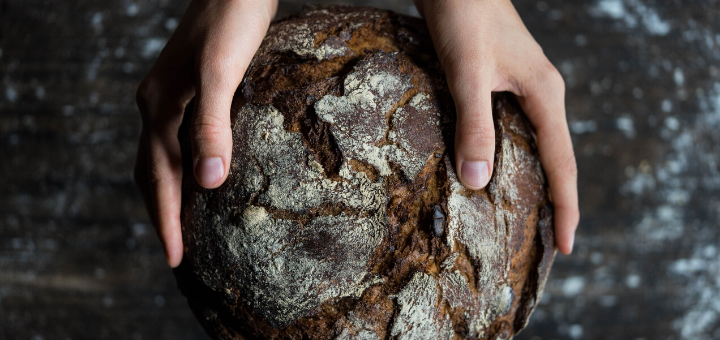
 Image created by the author in Canva.com using free elements.[/caption]
Though Ordinary Time has just begun, it is a short beginning. Preparations are already underway for Lent’s quick approach next week. One of the primary aspects of Lent is fasting, particularly from meat on Ash Wednesday and all Fridays during the season.
Lent has a unique relationship with food. On one hand, it encourages us to eat more simply, to fast and abstain. Many people choose to fast from some kind of food or drink, giving up sweets, soft drinks or alcohol. But then by some weird logic, the very act of giving up certain foods then seems to create a fixation with that food. Abstaining from meat means I spend a good deal of time that week looking up meatless recipes and alternatives. If I’m not careful, the whole purpose behind fasting is lost amid a hyper-focus on what I’m not eating and how to cook for my family.
Rather than creating a barrier, this Lent let’s allow cooking to open us up to God’s presence in our kitchen. Cooking, by its very nature, connects us with the Paschal Mystery.
Image created by the author in Canva.com using free elements.[/caption]
Though Ordinary Time has just begun, it is a short beginning. Preparations are already underway for Lent’s quick approach next week. One of the primary aspects of Lent is fasting, particularly from meat on Ash Wednesday and all Fridays during the season.
Lent has a unique relationship with food. On one hand, it encourages us to eat more simply, to fast and abstain. Many people choose to fast from some kind of food or drink, giving up sweets, soft drinks or alcohol. But then by some weird logic, the very act of giving up certain foods then seems to create a fixation with that food. Abstaining from meat means I spend a good deal of time that week looking up meatless recipes and alternatives. If I’m not careful, the whole purpose behind fasting is lost amid a hyper-focus on what I’m not eating and how to cook for my family.
Rather than creating a barrier, this Lent let’s allow cooking to open us up to God’s presence in our kitchen. Cooking, by its very nature, connects us with the Paschal Mystery.
Like fire itself, which photosynthesis destroys has created, all cooking begins with small or large acts of destruction: killing, cutting, chopping, mashing. In that sense, a sacrifice is at its very heart. (Michael Pollen, Cooked, p. 52)The Paschal Mystery is the theological term for the life, death, Resurrection and Ascension of Jesus Christ. Jesus teaches us through His whole existence on Earth what it means to be an offering of oneself. Through His sacrifice, we receive life everlasting. Each time we cook, the sacrifice inherent within the food we prepare offers us life for another day.
Cooking during Lent
We need to eat every day, which means we cook every day of the year. What can we do to make our cooking different during Lent? One idea is to slow our cooking down.When stirring the pot, just stir the pot. It seems to me one of the great luxuries of life at this point is to be able to do one thing at a time, one thing which you give yourself wholeheartedly. Unitasking. (Cooked, p. 195)Many of us rarely see this luxury. It’s not that we don’t have the time, it’s that we haven’t prioritized the time. This isn’t to say that each day you need to stand slavishly in front of the stove for hours, methodically stirring while your kids tear the house down around you. But you don’t need to be checking Instagram while stirring either. Maybe it means preparing elements of your meals in bulk ahead of time so you are better able to focus on what must be cooked day of. Things like rice, polenta, beans, and mashed potatoes are excellent make-ahead sides. Think about carrot and celery sticks, bell pepper slices, fruit salad or sliced oranges. Another idea for cooking more intentionally this Lent is to learn how to make something yourself which has otherwise intimidated you or alluded you. What might you learn from making your own bread or yogurt? Have you considered what goes into making jam or homemade pie crust? Perhaps you’ve always wanted to make your own baby food, or vinaigrette for salad, but have never taken the time to learn. When you make food “from scratch” you begin to learn how it’s components work together to form their new whole. There is a transformation that occurs as ingredients move toward harmony among each other. It is incredibly empowering and humbling to make your own food. Only after making your own bread will you begin to understand a person who, in order to have bread that day, must first make it.
To brew beer, to make cheese, to bake a loaf of bread, to braise a pork shoulder, is to be forcibly reminded that all of these things are not just products, in fact they aren’t even really ‘things.’ Most of what presents itself to us in the marketplace as a product is in truth a web of relationships, between people, yes, but also between ourselves and all the other species on which we still depend. (Cooked, p. 408)Food is an integral part of Lent. The intentional absence of certain foods provides opportunities to simplify your table. It also can be a time to grow in your knowledge of a new type of food or cooking that can enrich your family’s eating habits.
Copyright 2020 Kate Taliaferro
About the Author

Kate Taliaferro
Kate Taliaferro is an Air Force wife and mom of 6. She has a Masters in Religious Education and tries to find God's presence in all parts of her day, be it cooking, cleaning or just the everyday ordinary. She enjoys homeschooling, stitching crafts and finding cheerios between the couch cushions. She blogs at Daily Graces.


.png?width=1806&height=731&name=CatholicMom_hcfm_logo1_pos_871c_2728c%20(002).png)
Comments